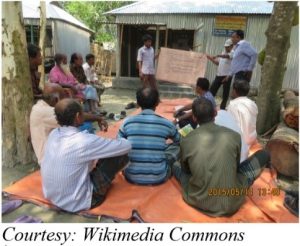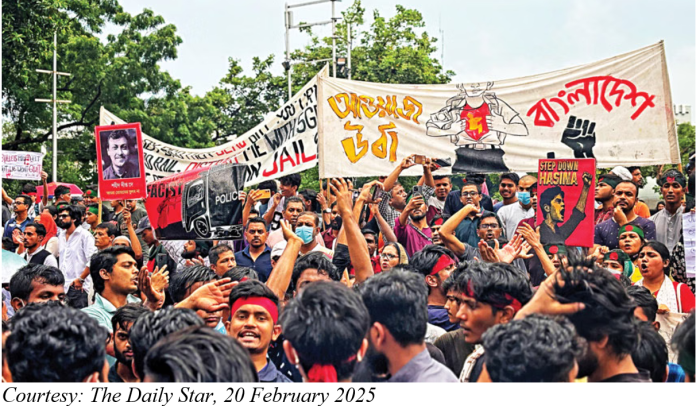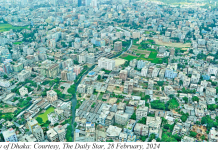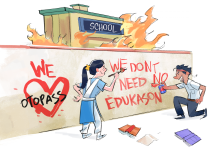History does not often hand societies a clear moment to pause, reflect, and reinvent. Yet Bangladesh now finds itself standing at precisely such a moment. In the aftermath of the events following 5 August, the political reshuffling, the banning of a major party, and the transition from a familiar order towards a new and evolving political landscape, we are not just facing a vacuum. We are facing a possibility.
A possibility to rethink the very nature of politics in our country. A chance to choose something different, something healthier, more inclusive, and more visionary.
A culture in transition
For decades, politics here has been vibrant and energetic, but often highly confrontational. Leaders have frequently emphasized their differences through rhetoric, which has sometimes overshadowed the space for substantive debate.
In such an environment, even when strong institutions are built, they can face challenges in realizing their full potential. As Why Nations Fail (by Daron Acemoglu and James Robinson) puts it, “Even when inclusive political institutions emerge, they can collapse quickly if they are not backed by a broad coalition committed to upholding them.” In other words, rules mean little without trust and shared legitimacy.
Reform has been a continuing aspiration. But reforms alone are not enough if the deeper political culture does not evolve alongside them. It is like renovating a house where structural adjustments are still needed at the foundation.
Trust is the foundation
The real question we face is not only who holds power, but how power is imagined, exercised, and shared. It is about trust. Mutual trust among community members of diverse backgrounds, beliefs and professions. Trust in institutions. Trust between citizens and leaders. Trust that opposition does not mean betrayal. And trust that a different kind of politics is even possible.
“Successful societies are not ones with perfect leaders,” Acemoglu and Robinson write, “but those with inclusive institutions that channel the energy and ambition of their citizens into positive and collective outcomes.”
So, what would it mean to build such a society in Bangladesh?
Breaking the binary trap in politics
The first step towards genuine political renewal is to move beyond the binary dynamic that has long shaped our political imagination. The old political culture creates a cycle of competition that focuses less on new ideas and more on rivalry. Such politics can sometimes limit progress towards the broader agenda of public service and national development.
This is not a reinvention of politics—it is a recycling of older patterns. What we need now is a conscious break from this cycle, a deliberate reversal of the mindset that defines politics mainly through blame and rejection.
Real progress begins when we stop defining ourselves only by what we oppose, and start organizing around what we share.
Moving towards positive competition
Imagine a political culture where the goal is not to discredit, but to deliver. Where parties compete not over past grievances, but over who can govern better. Where elections are about policy, not personality.
Political scientists call these “critical junctures”—rare moments when structures shift and new norms can take root. As Why Nations Fail explains, these moments are when “small institutional differences… can lead to very different paths of development.” Bangladesh may be living through one of those moments now.
Learning from elsewhere
There are models of this elsewhere. In Germany, coalition governments are built across ideological lines because national stability comes first. In Rwanda, post-conflict rebuilding was anchored in an agreement that national unity had to come before party interest.
New Zealand under Jacinda Ardern showed that civility in politics is not a weakness but a strength. And in Scandinavia, fierce electoral competition is matched by sincere cooperation once votes are counted.
These are not perfect systems. But they offer something we can learn from: political decency. The ability to disagree without destroying. To differ without dividing.
Good politics is not the absence of opposition—it is the presence of respect.
A lesson from the Caliphs
The Islamic tradition also gives us a powerful example, one that speaks directly to parties who claim to follow religious values.
The four rightly guided Caliphs of early Islamic history—Abu Bakr, Umar, Uthman, and Ali—were very different in style, temperament, and even policy. Abu Bakr (R.A.) was firm and unifying during multiple crises. Umar ibn al-Khattab (R.A.) introduced bold administrative reforms. Uthman (R.A.) standardized scripture and expanded the empire. Ali (R.A.) led during deep internal divisions, but never responded with vengeance.
What held them together was not the sameness, but sincerity. They disagreed. But they also respected each other, worked for a higher purpose, and accepted each other’s legitimacy.
Beyond just history, it is a challenge to our present. If Islamic parties in Bangladesh genuinely want to honour this legacy, they must rise above rivalries and rediscover a politics rooted in integrity and respect.
A culture rooted in trust
Trust is the critical element of social capital or contract that acts as glue to bind diverse sections of society. This is fundament for national unity and consensus. But trust does not appear overnight.
There two aspects of trust – mutual trust between different sections of society and trust between the government and governed. Together, they form social contract.
 Mutual trust is built through repeated interactions among various sections of society. It can happen in civic organizations, such as alumni associations, lawyers’ associations, etc., provided they are not divided along party or ethnic/religious lines. Such civic organizations offer platforms where differences are mediated before they are blown up leading to violence.
Mutual trust is built through repeated interactions among various sections of society. It can happen in civic organizations, such as alumni associations, lawyers’ associations, etc., provided they are not divided along party or ethnic/religious lines. Such civic organizations offer platforms where differences are mediated before they are blown up leading to violence.
Trust between the government and governed grows and gets consolidated when citizens feel they are seen, respected, and included, regardless of which party or section they support. This requires more than institutional engineering.
We need to revive the idea of shared responsibility, the sense that politics—more than winning—is about working together for the public good. That leadership means serving, not ruling. That loyalty to ideas matters more than loyalty to names.
As Oscar Wilde put it in De Profundis: “You can differ without dividing; lead without wounding; win without humiliating.”
Let us imagine a Bangladesh where politics is rooted in service, not slogans. Where parliaments are arenas of ideas instead of insults. Where young leaders rise through ideas and practices instead of inheritance. Where governance is shown in actions, not claimed in posters.
This is not a dream. It is a direction. And in this rare, fragile moment, it is a choice we still have time to make. It is a hope already signalled by some of the top politicians who carry the promise of our nation.
Let us not return to old binaries and rehearsed rivalries. Because what we build now will not just shape our politics. It will shape our future.

Ashfaq Zaman
Ashfaq Zaman, a Chartered Accountant turned Entrepreneur, has built a dozen successful businesses across diverse industries. He is the founder of Dhaka Forum, and Leadership Excellence and Development (LEAD), an organization that specializes in leadership training, research, digital influencers and leadership incubation. An alumnus of the University of Cambridge & having completed his six sigma from the University of Oxford, UK, he served SFAI International as a Regional Director of Asia Pacific for 4 years. Ashfaq is an ambassador of the honourable society of the Nation of High School Scholars formed by the Noble Sub Committee & a TEDx licensee/curator of TEDxGulshan. He represents as the board advisor of an international charity called Charity Right, overseeing thousands of meals delivered every month to the underprivileged. Ashfaq was a Mentor/Advisor for the British Queen Young Leaders Programme. As a strategic international affairs expert, Ashfaq has presented papers at various global conferences & forums penned frequent thought pieces for the BBC, The Diplomat, MNBC, Foreign Policy, Reuters, EuroNews & other global platforms. E-mail: ashfaq@zamancpa.com; ashfaqrulz@hotmail.com



